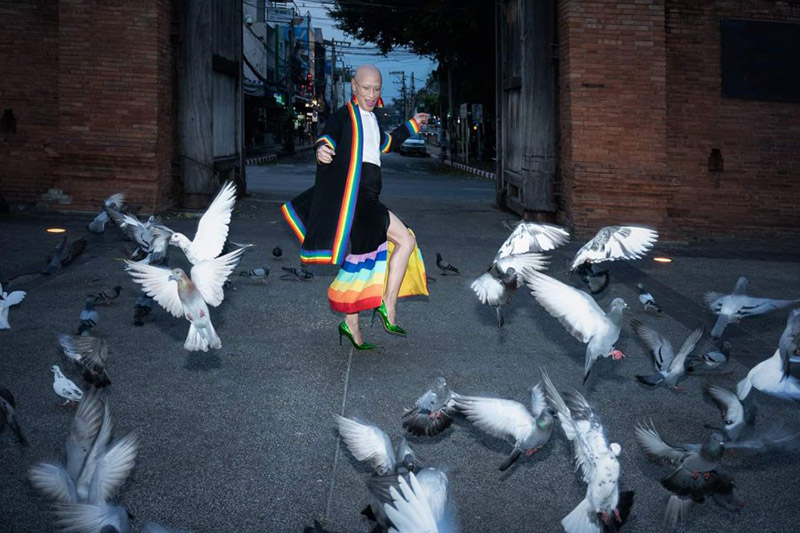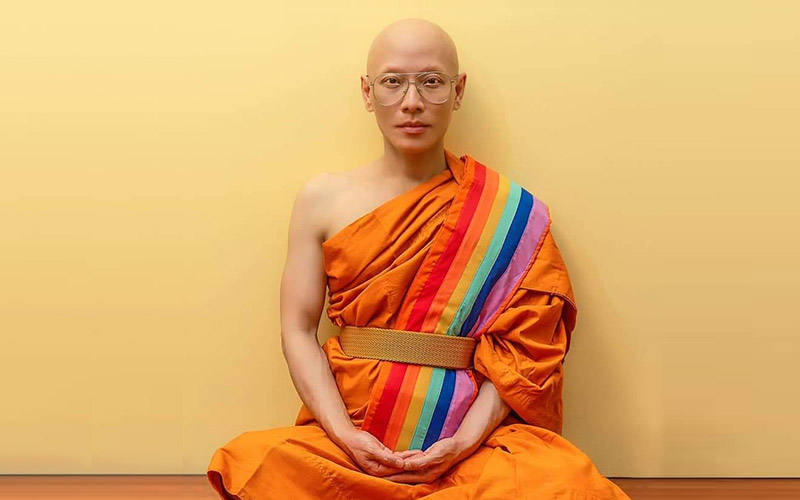Twelve years ago, LGBTQ+ activist Sirisak Chaited (they/them) drove Chiang Mai conservatives crazy by organizing the city’s first Pride parade. Recently, Sirisak made news again by posing in a saffron robe with a rainbow stripe on their shoulder for a gender-inclusive monkhood campaign. We spoke with Sirisak about the controversial campaign and their fight for equality.
How did you become a gender rights activist?
I suffered a horrendous attack at school, and it was never just about me being queer. With me being born to a Vietnamese immigrant family and without hair, I was an easy target for other kids because I was different. People would call me names like kaew to remind me that I wasn’t one of them. The fact that I wasn’t like the other boys my age made it worse. Some kids would pull down my pants and pretend to rape me. Teachers mocked me and threatened to break my back if I didn’t act manly enough. I couldn’t talk about this to anyone – even my own family since they were all Catholics. There was no one I could trust.
One day, I felt like I couldn’t take it anymore, and I took a whole bottle of pills to end my life. Little did I know that it was not that easy. I survived and was hospitalized for months. But when I got back, people were nicer to me. My mother had found my diary where I had written about everything I had suffered. She gave it to my teacher, who read a note I had written in front of the whole class. I didn’t know that my words could have such an impact. From then on, I grew more confident and swore to speak up about gender rights for other people.
What happened at Chiang Mai’s Pride in 2009?
Some villagers were furious. They threatened to march through the Pride Parade if we hosted it. At first, we thought it was just a threat. We didn’t know that they would actually follow through with it.
About 300 or 400 villagers blocked our way in and out of the parade. Some of them threw bags filled with blood and plaa raa (fermented fish) at us. They finally agreed to let us go if we agreed on the following: We must cancel the event immediately; we would not host another LGBTQ+-related event for the next 1,500 years, and we would have to crawl on our knees to apologize. It’s unthinkable that they didn’t see us as humans. I was furious. We may have differences, but we should be able to stand equal as humans. Ultimately, we only agreed to cancel the parade and took a risk to make a public statement by hosting a candlelight vigil.

Why did you start this campaign for gender-inclusivity in monkhood?
Over the past few years, I have been challenging gender discrimination in Thailand in several different fields. My previous campaigns specifically targeted uniforms that are narrowly defined by gender. For example, I advocated for the right for transgender people to wear female public servant uniforms or university students to wear gowns that fit their gender identities at graduation ceremonies. Now, I’m challenging our right to enter the monkhood, since it’s one of the most male-reserved realms in Thai society.
Did you get in trouble for wearing the monk’s robe?
It was like a costume. Many Thai comedians have worn it in movies. It isn’t like I was wearing this to deceive anyone into thinking that I was really a monk. I just wore it because I knew that it would spark debates.
‘We’re talking about normal people – ordinary people like us whose voices aren’t loud enough.’
Some commentators cited the Buddha’s teaching that gay people can’t be ordained. What’s your take?
If you carefully read the religious texts, the part where gay people are not permitted to enter the monkhood came from a Buddhist parable told many centuries ago [that described gay people having sex after they were ordained]. That has made people jump to the conclusion that LGBTQ+ people would behave this way. Give people more credit than that.
So as long as people act according to the rules, anyone can become a monk?
People can lead monastic lives as long as they aren’t acting against the rules. It’s not about their gender or genitals. We aren’t asking for more privileges; we simply want to be equally recognized for whatever we believe in. We aren’t calling for the right for LGBTQ+ monks to wear makeup or engage in oral sex inside temples. Our demand is simple: Everyone should have the right to enter the monkhood.
Some have said that gay monks are pretty common nowadays, so what’s the point of this campaign?
Just because some gay people can ordain doesn’t mean that all people can. People usually have this misconception when they see gay celebrities ordained. But the problem is they often overlook the fact that these gay celebrities have louder voices. Supposing they were to be denied their rights, they could just post about it on Instagram to their 100k+ followers and suddenly their massive fan clubs will speak out to support them. We’re talking about normal people – ordinary people like us whose voices aren’t loud enough. Some of my friends told me that they want to ordain as monks, but people in their local communities thought it would be inappropriate. Some had to move to a different temple so that they could be ordained without facing backlash [from their communities]. That’s why I’m fighting to end all this.
A quick look at your Facebook post suggests many LGBTQ+ people don’t wholly support this either. Why?
Gender discrimination is deeply entrenched in Thai society, and it’s so subtle that people don’t usually see it. Since we were kids, we have been taught to believe that we are wrong for being born gay, that it is a sin waiting to be atoned for. So when they see religious texts sanctioning homosexuality, they readily embrace it without realizing the errors within it.
What’s your thoughts on the future of LGBTQ+ monkhood?
The dhamma didn’t fall from heaven; these rules were written by humans. I don’t mean to disregard people’s beliefs, but before people could be ordained as monks to create these rules and norms, they were all humans. If humans are behind the teachings, then humans should have the right to criticize and change them as well – even if it may take a long journey to make that a reality.




